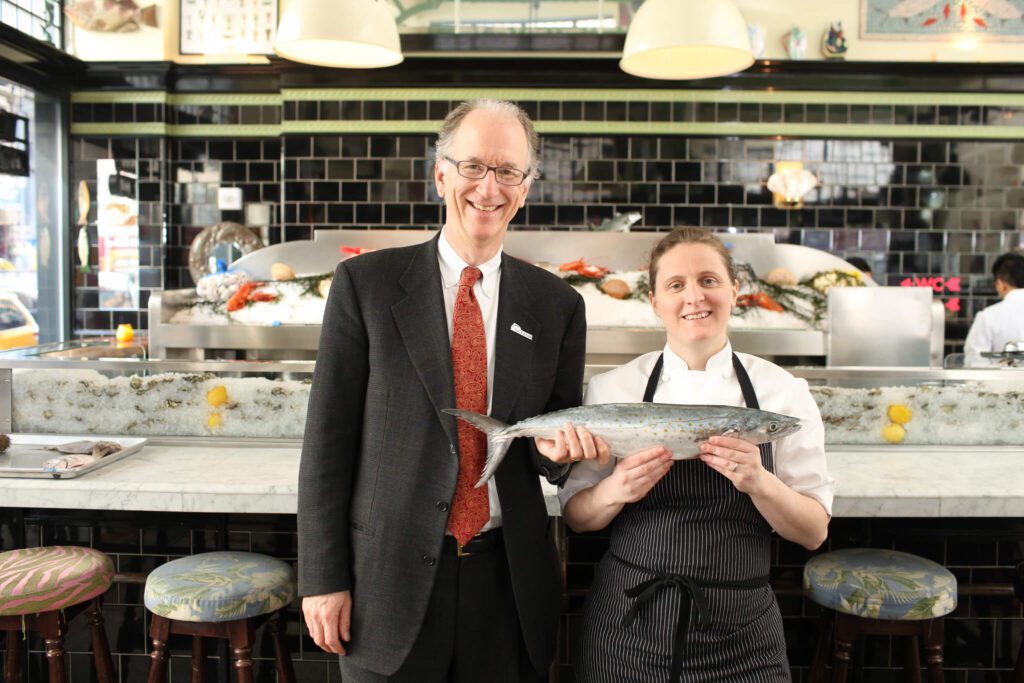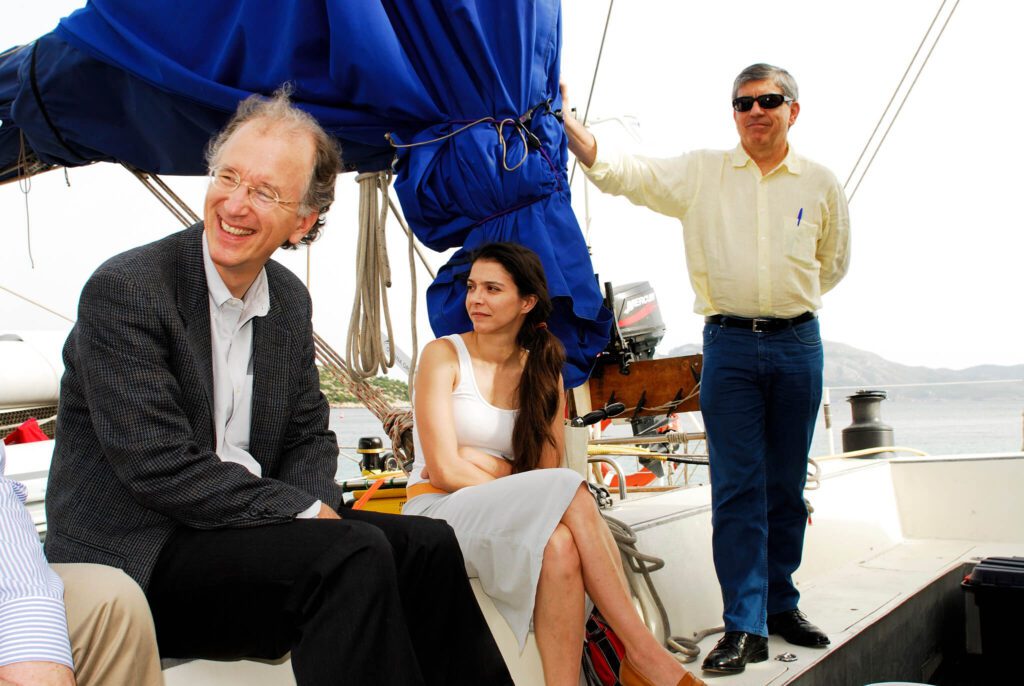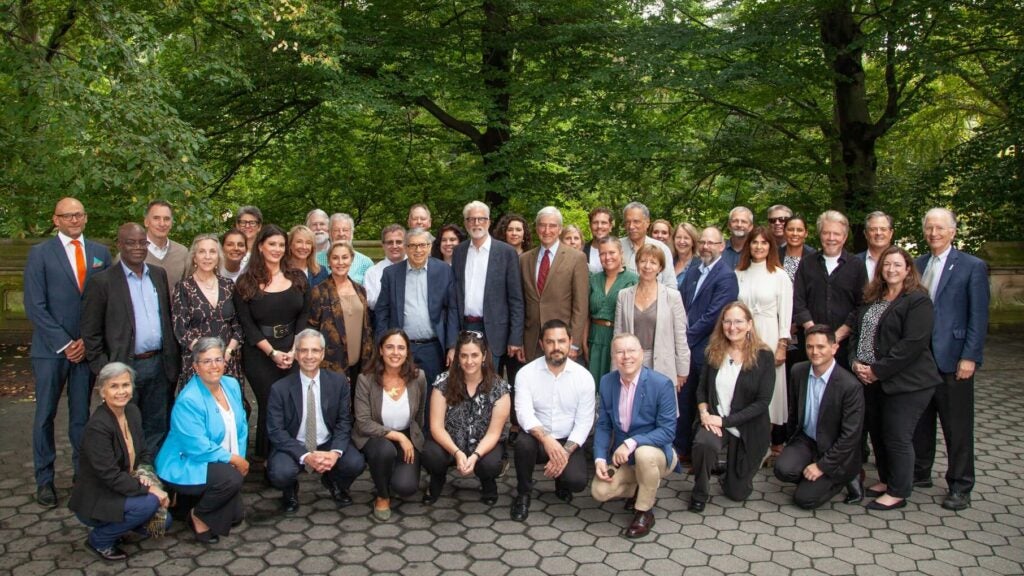September 10, 2024
A Conversation with Andrew Sharpless: Oceana’s Retiring CEO Reflects on 21 Years at the Helm and What’s Next
BY: Sarah Holcomb


You’ve led Oceana for over two decades. Why have you dedicated so much of your career to the oceans?
Because we are effective in delivering national scale policy changes that restore and protect an abundant and biodiverse ocean. It’s been incredibly exciting to lead a team based in more than a dozen countries that is impacting our planet’s future as well as the livelihoods and prospects of hundreds of millions of people living in coastal communities. A rebuilt ocean can feed a billion people a healthy seafood meal every day, forever.
When you arrived at Oceana, it was barely a year-old nonprofit start-up. What was key to Oceana’s early successes?
We believed in deadlines for change that were three or four years out, not five or 10. We were 100% clear about what policy outcomes we wanted, and what decision-makers we needed to target to get them done. We resisted the all too familiar temptation to spread ourselves thinly across too many goals. Our method was to work “country by country” rather than tangled up in the slow-moving consensus processes typical of international treaties. We made hard choices — “we’re going to do this, and not that.”
We empowered in-country campaign teams to find a way to win. Any tactic that was within the law was fair game. We were realistic about the balance of power — could we and our allies reasonably overcome the entrenched power of the fishing industry and corporate polluters? And we’ve always had a lot of respect for the effort and strategy it takes to win.
When facing a daunting question, I don’t think I’m alone in asking: What would Andy do?
Herbert “Beto” M. Bedolfe III, Oceana Board Member
We need a global marine conservation effort. What would Andy do? Answer: Hire great staff, set reasonable goals, launch campaigns around the world, evaluate, repeat.
Marine conservation is just a sliver of total environmental funding. What would Andy do? Answer: Travel like crazy, meet people who care, clearly explain the needs and importance of saving the ocean. Seek out the wisdom of others. Recruit people who believe in the cause and work 24/7 to get the resources needed.
How should we set goals in places facing very different issues? What would Andy do? Answer: Rely on smart, plugged-in, local leaders and staff to determine goals and strategies. Follow on-the-ground conservationists who know the turf…and the local ocean.
We need music! What would Andy do? Answer: Jazz, Sinatra, Rat Pack.
Andy is retiring! What would Andy do? Answer: Build a deep bench at the staff level, make sure there are others who can take the ball and keep the victories coming.
Have you always had this drive to protect the environment and the common good from powerful industries?
I always had a general concern that the public good was being damaged by big, powerful, selfish interests. I was an environmentalist as a kid and I’m old enough to remember the original Earth Day in Philadelphia, which I attended in 10th grade in Fairmont Park. I was really inspired by that.
When I came to Oceana, I was introduced to the scientific specifics about global scale ocean depletion and pollution. I fully embraced our theory of dealing with the problems of overfishing and pollution in a practical, policymaking way. Here we have the oceans — that is, 71% of the planet — being wrecked by overfishers and polluters, and I was convinced 21 years ago that we had a shot at stopping them in significant places, and in reasonably short order. By then I also had some experience of my own coming up against influential industries in a policy battle.
Many years before joining Oceana, you were a grassroots organizer bent on holding big utility companies accountable to citizens. What did you discover through organizing?
In my early 20s, I worked to pass a state-level law aiming to balance out the power of large utility companies — who control gas, telephone, and electric rates — by setting up consumer advocacy organizations. I went on to join the first staff of the Wisconsin Citizens Utility Board (CUB). The CUB was opposed by every gas, electric, and telephone company in the state, but we found a way to win. We wanted utility rates that were fair with limited environmental impacts.
The thing I learned about grassroots organizing is that you have to appeal to people’s self-interests. They’re busy and their lives are hard enough already. So if you’re going to ask them to help you, you can’t just rely on an altruistic appeal.
We discover again and again that when seeking allies for the high-minded cause of making sure the oceans are abundant and biodiverse, we better have allies who are self-interested in that outcome. Often that’s the small-scale fishing communities who want to continue to have fishing resources available to them, not stolen by big industrial fishing companies or wrecked by big polluters. The alliance is good for the world, good for the ocean, and in their self-interest. Busy people ask “what’s in it for me?” You have to respect that question.
I met Andy almost 10 years ago. His ability to captivate audiences has always amazed me and I decided to learn how to be a storyteller from him. I always wondered if his general knowledge came from all the books he reads, but throughout these years I have learned he keenly observes his surroundings and the people around him.
Liesbeth van der Meer, DVM, Oceana Senior Vice President
One day we were in an airport in Chile, and he just sat there watching people. He explained that domestic airports offer a lot of information about a country. We observed that at least 40% of flights were filled with miners going to northern regions of Chile, then elaborated statistics on what percentage of Chile’s population depends on mining. We discussed what it means for Oceana to campaign to protect the oceans when mining accounts for 20% of Chile’s GDP.
I now find myself sitting in airports around the world trying to tell a given country’s story through its demographic composition. This is just one of the many lessons that Andy has taught me about how to be a great storyteller to save the oceans.
You’ve worked at non-profits and for-profits, with start-ups and large companies. What have you learned about leadership across those different experiences?
It’s a lot easier to sound smart than it is to actually deliver results. I learned pretty early to be suspicious of glib-sounding speeches, and to be much more respectful of people who had a track record of actually succeeding in business or policymaking. I learned to ask the question: What have you done?
I wanted to be part of something that was real, not just something that sounded good and aspired to good things. I learned that very often it’s much harder to get the real outcome than it is just to talk about it.
What stood out to you about Oceana?
Oceana’s founders recognized an important fact: In many countries around the world there was no dedicated ocean advocacy policy organization. Ocean advocacy, to the extent that it was done, was being done by big, diversified NGOs that were spreading their attention between terrestrial issues and ocean issues. And in many cases, doing a very bad job on the ocean side of things, because the terrestrial stuff was more important to them and their donors. It was — and continues to be — harder to explain and raise money for ocean issues.
There was optimism among Oceana’s founders about the plan for Oceana. With all of the overfishing and pollution happening, this took courage. All the science showed that humanity was running in the wrong direction. But there was reason to say to each other, “Well, we’ve learned some lessons and nobody has applied these lessons with this level of focus to the oceans. And we think this can work.”
What did the original “blueprint” for Oceana get right?
The first “blueprint” was a 60-page document circulated among Oceana’s founders. This blueprint got a lot of things correct — for example, the necessity of clear, relatively short deadlines and concrete ways to measure success. It focused on real in-the-water impacts, rather than being overly concerned with processes.
The document said Oceana should focus on the basic problem of overfishing by confronting industrial fishing interests. (Which we have). It predicted that once the right policy is in place, the fish will come back pretty quickly — you can show results in the water five or 10 years after the species are well-managed. (Which we’ve seen).
The blueprint acknowledged that we’d need a diverse set of skills to make a real campaign effective. Not just science, but also grassroots, legal expertise, strategic communications, and direct advocacy. Keep your goals narrow, but your tactics broad. Specify the outcome so that you are at risk of real failure and put a deadline on it. Be formally and strictly accountable on these goals to your Board and backers. Working country by country, you can make a globally significant difference.
That campaign model was in our original plan. I think it’s brilliant and surprisingly accurate.
Andy’s leadership is marked by sharp thinking, keen listening, and shrewd negotiating. He deeply cares about the oceans and urgently works to improve our planet.
Imani Fairweather Morrison, Oak Foundation
Why does ocean conservation require a different approach than land-based conservation?
Since fish is a wild resource, if it’s abundant and can be sustainably caught in large numbers, that’s better for the ecosystem. This reality is very different than things on land, where the interests of agriculture and conservation are usually at odds. In the ocean, the agricultural interest — that is, the food interest — goes hand-in-hand with the interest of protecting an abundant ecosystem.
The oceans are important to prevent hunger. Fish is generally a climate-smart protein, especially compared to livestock like beef or lamb. The more we rely on wild fish, particularly smaller fish like sardines and anchovies, the more we will help reduce pressure on the climate and reduce biodiversity loss on the land driven by livestock production and industrial agriculture.
How is Oceana’s approach shaped by the importance of fish as food?
The conventional way that Western organizations have approached ocean conservation is as a wildlife and biodiversity project. At Oceana we certainly care deeply about protecting the biodiversity of the ocean, and Oceana is fighting important battles to protect species like the North Atlantic right whale from extinction. But the oceans aren’t just a safari park; they are a fundamental resource for humanity. They can feed a billion people a healthy seafood meal every day forever if they’re well managed.
There are 740 million people in the world living in coastal communities whose food, livelihoods, or both depend on abundant oceans. They include artisanal fishers that Oceana is campaigning alongside in places like Chile, Brazil, Peru, Mexico, and the Philippines. Moving forward, Oceana is seeking to also partner with communities in Ghana, Senegal, and Malaysia to make sure there are laws in place to keep those oceans well managed for the people who rely on them the most.
Over the last 20 years, few people have made such a profound positive impact on our oceans and the life they support as Andy Sharpless. His efforts have helped to preserve delicate ecosystems, reduce pollution, and restore vital fish stocks — and above all, he’s helped us change how we think about the oceans and reimagine our relationship with them.
Bill Clinton, United States President
In 2013, I was proud to write the foreword to Andy’s book, “The Perfect Protein,” because I believed — and still do — that sustainable fishing offers one of the best, most environmentally responsible ways to feed a hungry planet. With the world on track to reach 9.7 billion people by 2050, the effort to rebuild abundance is more important than ever.
In the years since I signed the U.S. Sustainable Fisheries Act into law, we’ve rebuilt nearly 50 fish stocks, and the number of overfished stocks in federally managed fisheries has dropped by two-thirds. And country by country, Oceana is scoring important policy victories that will help make those kinds of results possible elsewhere.
Andy Sharpless is a thoughtful and thought-provoking leader. I’ve enjoyed the opportunities I’ve had to learn from him through the years, and I wish him well in his retirement, knowing that he has built an organization that will continue making a difference long into the future.
What is a challenge that Oceana faces?
Democratic norms and practices are under assault, especially by populist right-wing politicians. We’re an organization of advocates for the ocean, seeking to use democratic policymaking rights to pass laws in service of the future. We need democracies to be effective. If they are broken, we can’t do our jobs.
Oceana campaigns in countries where democracies are often under threat by secret police, political opponents, policymaking opponents. Our teams in the Philippines and Belize face physical threats. Brazil and Mexico are also dangerous places for conservation work. Our teams show great courage in their campaigning.
What are you most proud of from your time at Oceana?
We’ve delivered what we said we would: transformative policy change in enough important fishing countries to make a globally significant impact. Take Canada, for example. It provides a striking “before and after” measure of Oceana’s impact. Canada didn’t have a law to prevent overfishing, now it does. They had no rebuilding plans, now plans are required for depleted stocks. Today Canada boasts one of the strongest laws banning the shark fin trade. In 2016, less than 1% of Canada’s marine habitat was protected; now 16% is protected, including almost all its seamounts. You’ll find similar results in all the countries where Oceana campaigns.
I’m also proud of Global Fishing Watch, a tool launched by Oceana, SkyTruth, and Google that transformed the visibility of activities at sea, especially commercial fishing, on a global basis in near real-time. We believed that fishing data should be in the public domain. Now it’s a free, public resource used by policymakers, journalists, researchers, fishers, our campaigners, anyone.
What do you hope to see Oceana accomplish in the future?
Some of Oceana’s ongoing campaigns will be, if we win, transformative for the oceans. We must win the battle against expanded offshore oil and gas drilling to combat climate change. We have a long way to go to stop plastic polluters from completely contaminating the oceans, the planet, our bodies, our air, and our water. I want Oceana to continue changing the paradigm on transparency so that all industrial commercial activity in the ocean happens in public view. We need to prioritize the role of an abundant ocean in protecting coastal communities. We need to discontinue the use of taxpayer subsidies for industrial fleets that are overfishing the oceans. There’s still a lot to be done.
What are you personally looking forward to after you retire?
I’m going to take some time and just be free for a little bit. I’m not signed up for anything new. I’m taking a hint from the Paul Simon song that says before you set your sails, you ought to drift in the breeze. So I’m gonna drift in the breeze. I look forward to just feeling better in my bones (thanks to more sleep and more exercise) and having more time for my family and friends.

Any last reflections?
There’s a price to success. Oceana is more famous and respected than it was two decades ago. People are asking us to do more than ever before — and in many cases not providing the resources necessary to do it all. So, there’s a new challenge: How do you continue to stay focused and effective?
It requires discipline to stay true to our model of being realistic, pragmatic, and accountable for real results — and not be seduced by really wonderful messages that aren’t backed up by the hard work of the lawyers and the lobbyists and the organizers and the scientists. That’s a word of caution. I know our talented teams, top leaders, Board of Directors, and important backers understand this. And if they forget, our winning campaign record presents a great set of examples to help keep us on track. I’m confident that the future will hold many more victories for the oceans.



